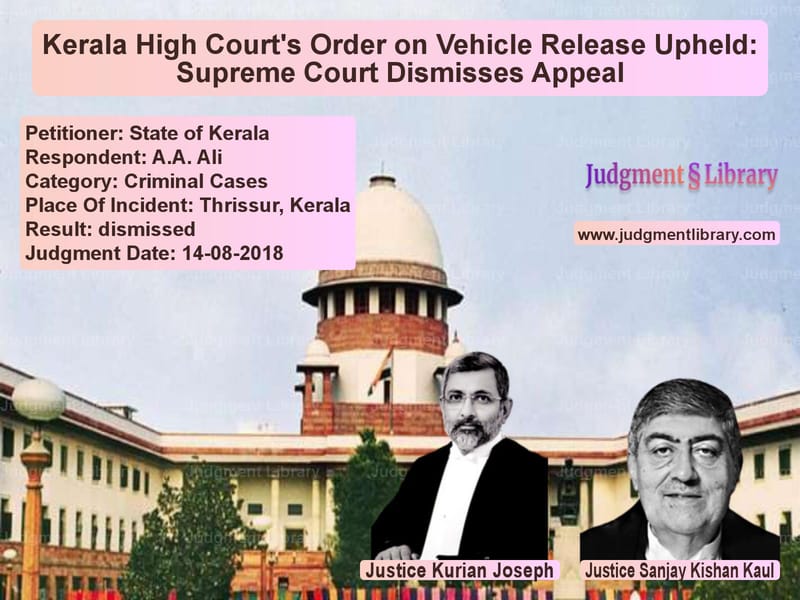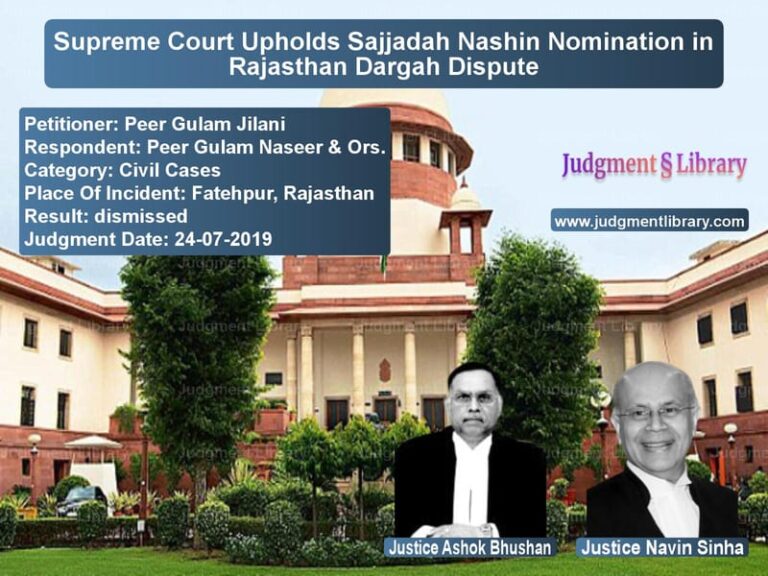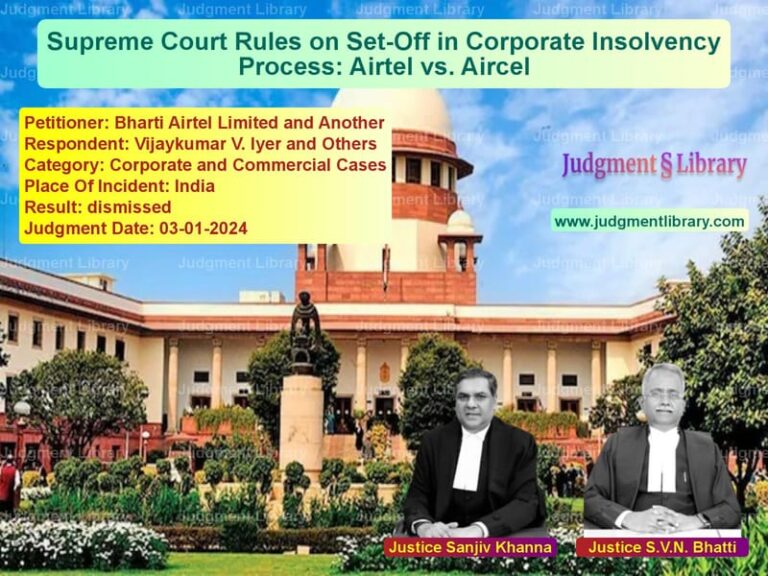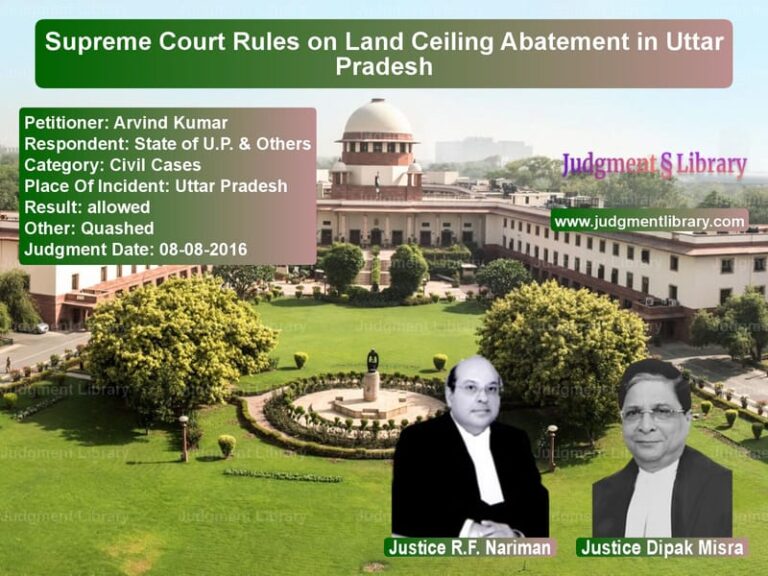Kerala High Court’s Order on Vehicle Release Upheld: Supreme Court Dismisses Appeal
The Supreme Court of India recently ruled in the case of State of Kerala v. A.A. Ali, a matter concerning the release of a seized vehicle under Section 451 of the Code of Criminal Procedure (Cr.P.C.). The dispute revolved around conditions imposed by the Magistrate for the release of a hydraulic excavator involved in a highway widening project. The Kerala High Court modified the Magistrate’s conditions, which led the State to appeal before the Supreme Court. However, the Supreme Court upheld the High Court’s decision and dismissed the State’s appeal.
Background of the Case
The case originated when A.A. Ali, a contractor engaged in widening the National Highway, sought the release of his seized vehicle—a Tata Hitachi Model EX 200 Hydraulic Excavator—under Section 451 Cr.P.C. The vehicle had been taken into judicial custody due to the alleged unauthorized demolition of a government building during the project.
The Judicial First Class Magistrate-III, Thrissur, permitted the release of the vehicle on the following conditions:
- Submission of a self-bond for Rs. 40,00,000/- along with two solvent sureties of the same amount.
- Providing a fixed deposit (FD) or bank guarantee equivalent to the alleged loss caused to the government building.
Challenging the Magistrate’s order, the contractor approached the Kerala High Court.
Arguments Presented
Petitioner’s (A.A. Ali) Arguments
The petitioner, A.A. Ali, argued that the Magistrate’s condition requiring a bank guarantee for the alleged loss was excessive and unnecessary. He contended:
- The excavator was crucial for completing the highway project.
- The demolition was carried out under the instructions of the superior officers involved in the project.
- Imposing a bank guarantee for alleged damages unrelated to the vehicle’s release was beyond the scope of Section 451 Cr.P.C.
State of Kerala’s Arguments
The State of Kerala, represented by the prosecution, argued:
- The damage to government property must be compensated before releasing the vehicle.
- The Magistrate had imposed reasonable conditions to protect the government’s financial interests.
- The High Court erred in removing the requirement of a bank guarantee.
Kerala High Court’s Decision
The Kerala High Court found merit in the petitioner’s arguments and ruled in his favor. The Court modified the Magistrate’s order by deleting the requirement of a bank guarantee, reasoning that the conditions should not exceed the scope of Section 451 Cr.P.C.
Supreme Court’s Observations
The Supreme Court, comprising Justices Kurian Joseph and Sanjay Kishan Kaul, reviewed the case and issued the following observations:
“In our view, the High Court is justified in holding that the bank guarantee for the alleged loss need not be insisted on for releasing a vehicle involved in the process.”
The Court emphasized that the contractor was engaged in an official government project and had acted on instructions. The demolition of the government building was part of the highway widening work and was not a personal or unauthorized act.
Final Judgment and Directives
The Supreme Court dismissed the appeal and upheld the Kerala High Court’s ruling with the following directives:
- The Magistrate must release the vehicle without requiring a bank guarantee.
- All conditions must align with Section 451 Cr.P.C., which focuses on the custody and disposal of property.
- The contractor shall continue his work without unnecessary legal obstructions.
Implications of the Judgment
- Judicial Clarity on Section 451 Cr.P.C.: The ruling affirms that conditions for the release of seized property should not exceed statutory provisions.
- Precedent for Contractors in Government Projects: Contractors executing government-approved work cannot be held personally liable for procedural demolitions.
- Limitations on State’s Power: The decision prevents authorities from imposing disproportionate financial conditions on accused persons.
Conclusion
The Supreme Court’s decision in State of Kerala v. A.A. Ali underscores the importance of judicial restraint in imposing conditions for releasing seized property. The ruling ensures that legal procedures remain fair, preventing unnecessary financial burdens on individuals executing government-sanctioned projects.
Petitioner Name: State of Kerala.Respondent Name: A.A. Ali.Judgment By: Justice Kurian Joseph, Justice Sanjay Kishan Kaul.Place Of Incident: Thrissur, Kerala.Judgment Date: 14-08-2018.
Don’t miss out on the full details! Download the complete judgment in PDF format below and gain valuable insights instantly!
Download Judgment: State of Kerala vs A.A. Ali Supreme Court of India Judgment Dated 14-08-2018.pdf
Direct Downlaod Judgment: Direct downlaod this Judgment
See all petitions in Bail and Anticipatory Bail
See all petitions in Fraud and Forgery
See all petitions in Legal Malpractice
See all petitions in Judgment by Kurian Joseph
See all petitions in Judgment by Sanjay Kishan Kaul
See all petitions in dismissed
See all petitions in supreme court of India judgments August 2018
See all petitions in 2018 judgments
See all posts in Criminal Cases Category
See all allowed petitions in Criminal Cases Category
See all Dismissed petitions in Criminal Cases Category
See all partially allowed petitions in Criminal Cases Category







